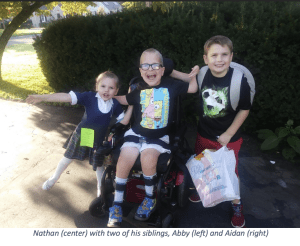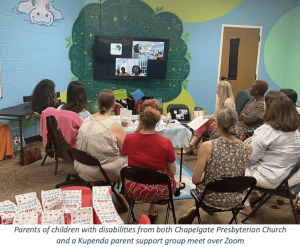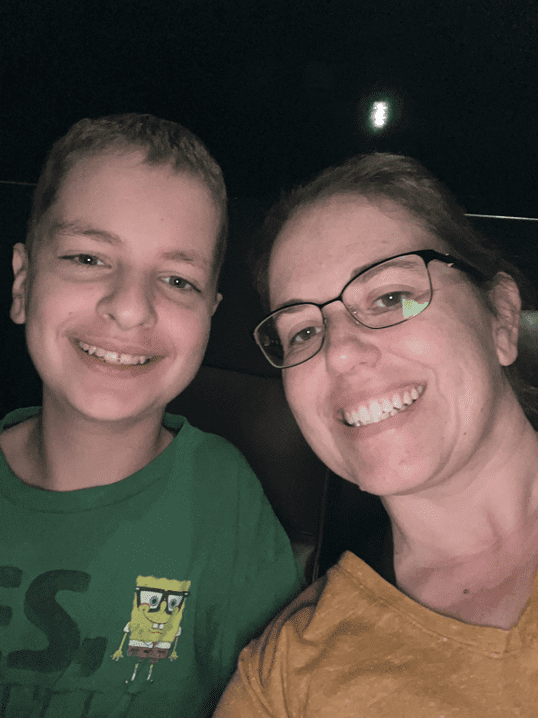Stronger Together: Support for Parents of Children with Disabilities
by Sara Furdui
Posted on October 28, 2024
Sara Furdui is a guest blogger for Kupenda who has graciously shared her writing talents, time, and experience with disability to support Kupenda’s work. She lives in Maryland with her husband, Ioan; five children, Abby, Nathan, Aidan, Luka, and Anna; and entourage of pets.
The first time I saw my son, Nathan, it was by accident. My husband and I were trying to adopt from the U.S. foster care system. For over a year, I had been looking at profiles online of children waiting to be placed in a home. When I opened the website this time, I accidentally clicked on a button that included the label: “children with severe disabilities” in my search. Our son’s sweet face popped up on the screen. “Why haven’t I seen him before?” I asked myself. The second photo answered my question. Nathan was in a wheelchair. He has a rare joint disorder that affects both his arms and legs. The national foster care database decided that a wheelchair equated to a severe disability. While it would not be the last time someone would make assumptions about my son based on his physical appearance, it did not stop us from embracing the role of becoming his adoptive parents.

Today Nathan has been a part of our family for almost six years. It’s been a joy to see him grow into a young man. This does not mean that parenting a child with special needs has been an easy road. And while I had many great intentions, I came into the position of “special needs mom” with a moderate level of naïveté. I assumed that disability resources were readily available in our community and that attitudes about persons with disabilities were generally positive.
I was mistaken.
Common Misunderstandings
I remember one medical resident who didn’t hide his revulsion while he awkwardly examined Nathan’s limbs. He lifted Nathan’s arms with just two fingers, as if he was something gross to touch. We have met medical professionals who had never heard of Nathan’s condition. It is discouraging to be the one constantly educating experts about Nathan’s needs.
In addition, we’ve encountered school officials who actively work against making changes to the way they teach or the services they are willing to provide. At times, even friends or family find it easier to exclude him from planned activities because of his wheelchair. I have learned that the world can be impatient with people who move slower, laugh too loudly, or require extra help.
Connecting with Kupenda Parents
During a recent Zoom meeting between parents of children with disabilities at my church and Kenyan parents of children with disabilities in a Kupenda parent support group, I saw that while my story may be unique, my experiences were not. One by one, the parents in Kenya went around the room and shared similar struggles. They talked about being worried that their children might be loud in church or be misunderstood in school. They told stories of people assuming they aren’t good parents because their child has unusual behaviors. And across the ocean, on a completely different continent, the moms in America could relate. The language was different, but the message was the same. We all love our children. We all want to see them grow, not just in our own families but within our communities.
Special needs parents don’t have the luxury of sitting back and blending into the background. Our families are often the focus of attention in public. Kupenda’s work towards community inclusion and parent education plays an important role in helping parents learn how to turn that spotlight into a platform for advocacy.
A Cord of Three
 As Special needs parents, we were chosen to be a voice for our kids. Sometimes those voices shake with fear or sadness, but that’s not a bad thing. During our Kupenda Zoom meeting, there were tears in both rooms. Some of the tears were from sharing hurts and some were from hearing our own hurt in the experiences of others. The Bible tells us that we are stronger together. “Though one may be overpowered, two can defend themselves. A cord of three strands is not quickly broken,” (Ecclesiastes 4:12).
As Special needs parents, we were chosen to be a voice for our kids. Sometimes those voices shake with fear or sadness, but that’s not a bad thing. During our Kupenda Zoom meeting, there were tears in both rooms. Some of the tears were from sharing hurts and some were from hearing our own hurt in the experiences of others. The Bible tells us that we are stronger together. “Though one may be overpowered, two can defend themselves. A cord of three strands is not quickly broken,” (Ecclesiastes 4:12).
When we first adopted Nathan, I didn’t always know how to handle his needs. If I could go back and give my earlier self advice or talk directly to special needs moms across the globe, I would say this: find other moms. Talk with moms whose kids have similar disabilities and struggles. Talk with moms whose kids are older and have been where you are (and come out the other side). Talk with moms who are trudging through the same murky waters. Share it all, the wins and the losses. There will be lots of people who don’t understand. They will tell you your child is a stone, when really, they are a diamond. But if you find other special needs parents, you will not be easily overpowered. And when you start to break, they will be there to put you back together.
You, you, have the hard and lovely job of being a parent. You have a front row seat to see how God uses the foolish things of this world to shame the wise, how God uses the weak things of the world to shame the strong (1 Corinthians 1:27). You get to experience the honor and privilege of being called, “mother.” What greater blessing can there be?
Want to keep updated on Kupenda’s work?
Follow us on Facebook, Instagram, LinkedIn, TikTok, YouTube, and Twitter.
Learn more about Kupenda in our podcast.
Sign up for our newsletter.




Leave a Reply